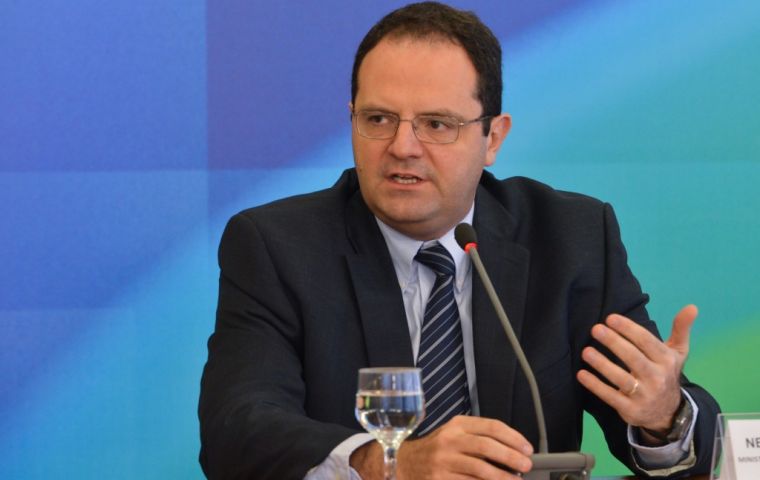MercoPress. South Atlantic News Agency
Brazil's Barbosa insists fiscal policies to shrink budget deficit “will be maintained”
 “Our economic policy remains in the same direction,” Barbosa told reporters in English on a conference call
“Our economic policy remains in the same direction,” Barbosa told reporters in English on a conference call  On Tuesday the market reaction was more muted, with the Real closing slightly stronger and the Ibovespa higher.
On Tuesday the market reaction was more muted, with the Real closing slightly stronger and the Ibovespa higher.  Levy was brought in at the start of this year to try to regain the confidence of financial markets after four years of spend-drift economic policies
Levy was brought in at the start of this year to try to regain the confidence of financial markets after four years of spend-drift economic policies Brazil’s new finance minister, Nelson Barbosa, continued his effort to win over investors on Tuesday reiterating that the government of president Dilma Rousseff will maintain the same fiscal policies intended to shrink the budget deficit and cut debt that were favored by his predecessor.
Barbosa was sworn in Monday, replacing Joaquim Levy at the helm of Brazil’s financial policy, but he is seen by investors as representing the interventionist, free-spending policies favored during Dilma's first term in office.
“Our economic policy remains in the same direction,” Barbosa told reporters in English on a conference call, an almost exact translation of comments he made in a call on Monday with investors.
The Brazilian Real weakened against the dollar and the benchmark Ibovespa stocks index fell after Monday’s call as many analysts said investors are tired of talk and want results. On Tuesday the market reaction was more muted, with the Real closing slightly stronger and the Ibovespa higher.
Levy was brought in at the start of this year to try to regain the confidence of financial markets after four years of economic policies that left 12-month inflation above 10% and the economy expected to contract more than 3.7% this year.
One of Levy’s main goals was to safeguard the country’s investment-grade credit rating. He ultimately failed as Congress declined to approve many of his proposed tax increases and spending cuts, and Fitch Ratings joined Standard & Poor’s in downgrading Brazil’s rating to junk status.
Even with those downgrades, Brazilian bonds are still a good investment, Barbosa said Tuesday. He said inflation is set to slow next year, though not as much as the government would like, and economic growth would recover more quickly than many expected.
Levy was stymied in Congress partly because of resistance from members of Rousseff’s populist Workers’ Party to his austerity measures. Another factor was the plunge in the president’s popularity over the course of the year as the economy struggled and a giant corruption scandal at state-controlled oil company Petrobras implicated many of her party’s members.
Many of Brazil’s biggest construction companies are charged with overbilling Petrobras, as the oil company is known, for projects, then distributing the extra money to the state-controlled company’s executives and politicians.
The company, also reeling from the plunge in the price of oil, has had to slash its investment spending and sell off assets as it struggles to deal with a giant debt load
Barbosa said he nevertheless doesn’t expect the government to have to step in and recapitalize the company, adding that Petrobras’ situation has improved since the start of the year and its management is “taking the decisions necessary to improve operations.”




Top Comments
Disclaimer & comment rules-

-

-

Read all commentsYeah, this will work: NOT.
Dec 23rd, 2015 - 11:07 am 0If I had been there I would have asked him what relation to The Liar Mantega was he?
This is such a stupid line to spout, he must think everybody is as stupid as him.
The only guy that could fix this right left because he knew the Congress wouldn't implement the austerity plan.
Dec 23rd, 2015 - 12:54 pm 0They're doomed.
The best part of this is I don't see any more Brazilians traveling in the USA.
The market's reaction to the change in Ministers, as well as to Barbosa's proposals, was negative.....the USD went over the 4 Real mark, the stock market dropped....and with a projected reduction in the GDP in 2015, of 3,6%, plus a 12-month inflation rate nearing 11%, don't see things getting better too soon. He called international and domestic investors, trying to convince them of his good intentions, but everyone knows that Barbosa will do nothing that displeases fat-ass, so nothing of essence will change....just a few cosmetic changes here and there, to kid the gullible idiots of the PT.
Dec 23rd, 2015 - 07:39 pm 0Commenting for this story is now closed.
If you have a Facebook account, become a fan and comment on our Facebook Page!